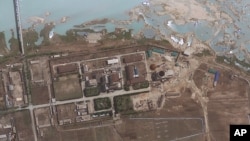China’s recent warning that North Korea might have expanded its nuclear weapons capability could be a sign of Beijing’s growing frustration with Washington’s refusal to have dialogue with Pyongyang, a former nuclear arms adviser to President Barack Obama said.
Last week, The Wall Street Journal reported that China’s top nuclear experts told U.S. nuclear specialists that Pyongyang may already have 20 warheads. Previously, U.S. experts have estimated that Pyongyang has between 10 and 16 nuclear weapons.
Gary Samore, who served as White House coordinator for weapons of mass destruction nonproliferation and counterterrorism from 2009 to 2013, said the Chinese warning is unprecedented.
“This is very new for the Chinese government to present an alarming picture of North Korea’s nuclear program. For all these years I have worked on North Korea, the Chinese tendency was to downplay the seriousness of the North Korean nuclear threat,” said Samore in an interview with VOA's Korean service Friday.
Samore said the Chinese government must have authorized these experts to release the estimates of North Korea’s nuclear weapons capability. The nonproliferation expert said a stalemate between Washington and Pyongyang over the communist country’s nuclear weapons program might have prompted Beijing to issue the rare warning.
“It may very well be that the Chinese are increasingly uncomfortable with the Obama administration’s refusal to reengage in diplomacy with North Korea,” he said.
Samore said Beijing is trying to push Washington to reengage Pyongyang in an attempt to contain Pyongyang’s behavior. Beijing is worried that Pyongyang’s provocative actions would embolden Washington’s position on its military buildup in the region, including the possible deployment of the Terminal High Altitude Area Defense (THAAD), an advanced U.S. missile defense system in South Korea, according to Samore. Beijing publicly raised objections to the potential deployment.
“I see this as a sign of some nervousness on the part of China that Kim Jong Un may do something provocative that would hurt China’s national interest. Obviously, the THAAD is the issue that the Chinese are most concerned about as an immediate issue,” said Samore.
Samore said Pyongyang is unlikely to abandon its nuclear weapons in the near future, adding that Washington should focus its diplomacy on containing Pyongyang’s nuclear weapons program.
Washington and Pyongyang have been at odds over the resumption of nuclear talks. Washington insists that Pyongyang show commitment to denuclearization before it agrees to resume the talks, but Pyongyang demands Washington withdraw hostile policies against it. The talks have been stalled since late 2008.




